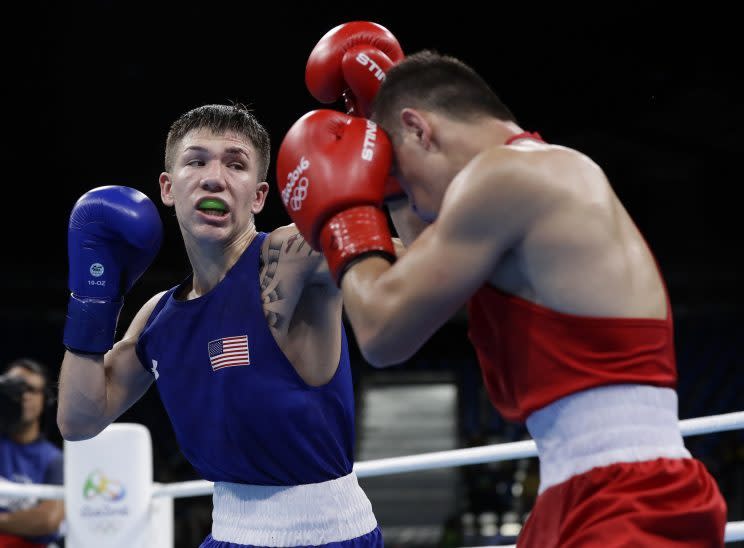Nico Hernandez loses semifinal bout, still ends USA Boxing's Olympic medal drought

Lucky Stars of Rio: Manuel’s historic win in swimming | Another 200 gold for Phelps | Ryan wins gold in 200

RIO DE JANEIRO — Seven months ago, the only person around USA Boxing who believed that Nico Hernandez was good enough to win an Olympic medal was Nico Hernandez.
Hernandez, a 20-year-old from Wichita, Kan., saw his gold medal dream ended on Friday after dropping a unanimous decision in his Olympic light flyweight semifinal fight to Uzbekistan’s Hasanboy Dusmatov.
The bronze-medal winner was hardly a loser in U.S. boxing coach Billy Walsh’s eyes, however. He established himself as a player on the world stage, won an Olympic medal and gave the program a much-needed jolt.
The U.S. men’s team failed to win a medal at the 2012 Games in London, and managed just a bronze by Deontay Wilder in 2008 in Beijing. No American male has won a gold since Andre Ward in Athens in 2004.
Little was expected of this U.S. team, and Hernandez in particular. But he went 3-1 in the tournament and likely will recall this Olympic run fondly despite his immediate disappointment over a defeat in what turned out to be a winnable fight.
“Definitely disappointing because I wanted to go home with the gold medal and I’m leaving with the bronze,” Hernandez said.
He fought a more experienced opponent who was well coached, but he more than held his own after a shaky opening three minutes.
Dusmatov clearly won the first round on all judges’ cards. And Hernandez clearly took the third.
Walsh thought Hernandez might have done enough in the second to ultimately steal the fight, but he was more eager to look at the broader picture.
“I’m very proud of him, where he’s come from and what he’s achieved in our short space of time together,” said Walsh, who was hired in November as the U.S. coach after previously guiding Ireland. “It’s fantastic. He’s No. 3 or 4 in the world and he was nowhere near that. He was beaten in the Top 32 in Doha [Qatar] a few months back.”
Walsh added he thinks Hernandez still has room to grow. Hernandez said he’s going to go home and think about his future and will talk with his father about whether he should turn pro.
Walsh said Hernandez could be a gold-medal contender should he return to make a run in Tokyo in 2020.
“We can develop him,” Walsh said. “He can consistently become a world-class performer on this stage.”
He fought an elite opponent who has been around the scene far long. Dusmatov is a good boxer who hits hard. He moves his head and is an elusive target, so Hernandez had his hands full.
At 5-foot-2, Dusmatov is three inches shorter than Hernandez and so he had to fight in close. Walsh wanted Hernandez to keep Dusmatov on the end of his jab and unable to get into proper punching range, but Hernandez’s jab was largely non-existent.
Dusmatov, though, was able to get inside and do damage early in the fight.
“I didn’t stay on the outside and move enough,” Hernandez said. “I fought his fight instead of my own. I let him come in and make the fight too wild, and that’s how I lost.”
He lost the first round clearly, which has become a disturbing trend for the U.S. team. Lightweight Carlos Balderas, who followed Hernandez, likewise dropped the first. And Hernandez lost the first in his bronze-medal winning bout against Ecuador’s Carlos Eduardo Quipo Pilataxi.
That’s ominous in a three-round fight.
“I preach to them all the time, 80 percent of the guys who win the first round win the fight,” Walsh said. “I compiled all the stats from when we were in Ireland, and we have all the stats. Eighty percent of the guys who win the first round win the fight. So you’ve got to be crazy to win that first round.”
Still, despite the disappointment, Hernandez figures to have a bright future, whether he stays in the amateurs or turns pro.
There are a lot of highly skilled junior flyweights and flyweights in the pro ranks, and they don’t often get paid the kind of purses that the middle- and heavier-weight fighters tend to get in the U.S.
But Hernandez already has a pro style and, with maturity, he figures to pack a bigger punch.
“This is another level of experience, the highest level I’ve ever been on,” Hernandez said. “I really, definitely, learned a lot and I gained a lot of experience. I learned to focus on the opponent and not what’s going on around me.”



